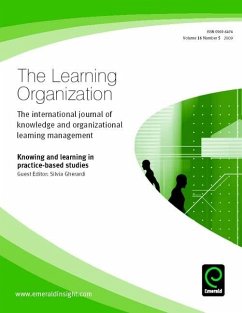
Knowing Across Boundaries (eBook, PDF)

PAYBACK Punkte
63 °P sammeln!
The main studies on knowledge management are focused on "e;cross border knowledge transfer"e;. Effectiveness of knowledge transfer (trust, cultural alignments and openness to diversity) is central in order to cross organizational boundaries. Though this issue is central, other topics are equally important. Scientific boundaries and epistemic boundaries are major topics less investigated in organizational context.This e-book is meant to cross different types of boundaries. Boundary raises the question of the "e;inside"e; and the "e;outside"e; of organisations. Studies ab...
The main studies on knowledge management are focused on "e;cross border knowledge transfer"e;. Effectiveness of knowledge transfer (trust, cultural alignments and openness to diversity) is central in order to cross organizational boundaries. Though this issue is central, other topics are equally important. Scientific boundaries and epistemic boundaries are major topics less investigated in organizational context.This e-book is meant to cross different types of boundaries. Boundary raises the question of the "e;inside"e; and the "e;outside"e; of organisations. Studies about the strategic positioning of organisations through knowledge management are considered mainly in two complementary approaches (Ermine & al., 2014) .The first one emerged from the question of processing the formalization of risk and knowledge retention. From this perspective, organisational reliability is achieved through an intra-organisational process of knowledge modelling.The second approach tried to take into account social environments as driving forces behind the organisations' strategic positioning in terms of operations and sourcing. This corresponds to an exogenous process through which the social structures generating specific knowledge, can be identified (e.g: epistemic communities and technological associations).If knowledge is both in and out an organisation, then the knowledge processes between the two need to be specified.
Dieser Download kann aus rechtlichen Gründen nur mit Rechnungsadresse in A, B, BG, CY, CZ, D, DK, EW, E, FIN, F, GR, HR, H, IRL, I, LT, L, LR, M, NL, PL, P, R, S, SLO, SK ausgeliefert werden.













